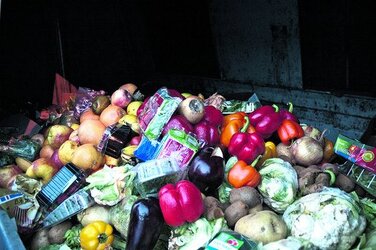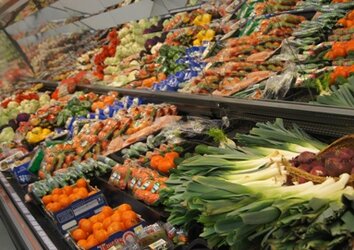i was here 5 minutes and instantly fell in love with Islenska and its people.
everyone is really cool and friendly.
then, i found this...
http://grapevine.is/news/2014/04/04/a-dumpster-divers-paradise/
News

A Dumpster Diver´s Paradise
Words by
Nanna Árnadóttir
@nannaarnadottir
Photos by
Páll Hilmarsson
Published April 4, 2014
It is estimated that the average Icelandic family discards upwards of 140.000 ISK worth of food each year, reports RÚV.
“[Iceland] is a paradise for dumpster diving,” said Andrea Burghess at Slow Food Reykjavík’s food waste seminar at the Nordic House yesterday. “I haven’t dared [to dumpster dive in Iceland] much but I’ve gone on my own now and then. For me it’s not really an issue of money but a way of life or a protest.”
During the seminar attendees were invited to eat a variety of dishes made from food found by dumpster divers in the capital.
“The only thing we added that we couldn’t find was about half a litre of oil and some salt,” said chef Dóra Svavarsdóttir who helped prepare the dumpster buffet and insists all that is required of a dumpster diver is a bit of common sense and a good sense of smell.
“I’m just starting out so I am still a bit prejudiced against [dumpster diving] but I think the project is really cool,” said seminar attendee Anna Ágústsdóttir who admitted the food was really delicious.
“I’m not sure what I am eating, but it tastes good,” said fellow attendee Imur Dögg Gísladóttir.
http://icelandreview.com/news/2013/03/08/dumpster-divers-feed-discarded-food-iceland
NEWS
Dumpster Divers Feed on Discarded Food in Iceland
March 08, 2013 11:31Updated: January 30, 2014 20:24
A group of people in Iceland hardly spend any money on grocery shopping but manage to feed themselves and their families with dumpster diving, by picking up food from dumpsters outside supermarkets.

A supermarket in Reykjavík. Photo: Zoë Robert/Iceland Review.
When approached by Fréttatíminn, none of the dumpster divers would be interviewed by name but expressed their concern over the reaction of supermarket owners who have started locking their dumpsters or even poured chemicals, such as soap, over the food to make it inedible.
Most of the dumpster divers say this is a conscious lifestyle choice, a lifestyle which has become rather common abroad. By feeding on products that would otherwise end up in the trash, they are protesting society’s consumerism.
However, some of them state that they cannot afford to buy food and feed on products from dumpsters out of necessity.
Most of the dumpster divers know each other and stick together. They often go dumpster diving in groups, have mapped out the best dumpsters and share their experience of what food products are safe to consume even though they’re past the ‘best before’ date.
According to a recent British survey, consumers in the western world throw away 30-50 percent off all food products that they buy.
Icelandic households buy food worth almost ISK 100 billion annually, of which estimated ISK 30 billion (USD 238 million, EUR 182 million) end up in the trash.
A family of five might therefore throw away ISK 500,000 (USD 4,000, EUR 3,000) worth of food every year.
everyone is really cool and friendly.
then, i found this...
http://grapevine.is/news/2014/04/04/a-dumpster-divers-paradise/
News
A Dumpster Diver´s Paradise
Words by
Nanna Árnadóttir
@nannaarnadottir
Photos by
Páll Hilmarsson
Published April 4, 2014
It is estimated that the average Icelandic family discards upwards of 140.000 ISK worth of food each year, reports RÚV.
“[Iceland] is a paradise for dumpster diving,” said Andrea Burghess at Slow Food Reykjavík’s food waste seminar at the Nordic House yesterday. “I haven’t dared [to dumpster dive in Iceland] much but I’ve gone on my own now and then. For me it’s not really an issue of money but a way of life or a protest.”
During the seminar attendees were invited to eat a variety of dishes made from food found by dumpster divers in the capital.
“The only thing we added that we couldn’t find was about half a litre of oil and some salt,” said chef Dóra Svavarsdóttir who helped prepare the dumpster buffet and insists all that is required of a dumpster diver is a bit of common sense and a good sense of smell.
“I’m just starting out so I am still a bit prejudiced against [dumpster diving] but I think the project is really cool,” said seminar attendee Anna Ágústsdóttir who admitted the food was really delicious.
“I’m not sure what I am eating, but it tastes good,” said fellow attendee Imur Dögg Gísladóttir.
http://icelandreview.com/news/2013/03/08/dumpster-divers-feed-discarded-food-iceland
NEWS
Dumpster Divers Feed on Discarded Food in Iceland
March 08, 2013 11:31Updated: January 30, 2014 20:24
A group of people in Iceland hardly spend any money on grocery shopping but manage to feed themselves and their families with dumpster diving, by picking up food from dumpsters outside supermarkets.
A supermarket in Reykjavík. Photo: Zoë Robert/Iceland Review.
When approached by Fréttatíminn, none of the dumpster divers would be interviewed by name but expressed their concern over the reaction of supermarket owners who have started locking their dumpsters or even poured chemicals, such as soap, over the food to make it inedible.
Most of the dumpster divers say this is a conscious lifestyle choice, a lifestyle which has become rather common abroad. By feeding on products that would otherwise end up in the trash, they are protesting society’s consumerism.
However, some of them state that they cannot afford to buy food and feed on products from dumpsters out of necessity.
Most of the dumpster divers know each other and stick together. They often go dumpster diving in groups, have mapped out the best dumpsters and share their experience of what food products are safe to consume even though they’re past the ‘best before’ date.
According to a recent British survey, consumers in the western world throw away 30-50 percent off all food products that they buy.
Icelandic households buy food worth almost ISK 100 billion annually, of which estimated ISK 30 billion (USD 238 million, EUR 182 million) end up in the trash.
A family of five might therefore throw away ISK 500,000 (USD 4,000, EUR 3,000) worth of food every year.
Attachments
Last edited by a moderator:





